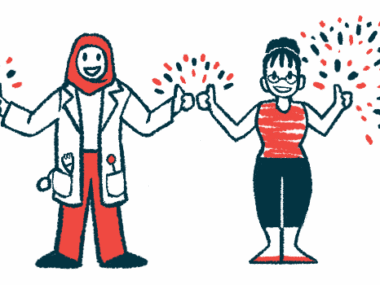New cell therapy improves physical function in refractory MG
Preliminary data suggest CAR-BCMA T-cells are well tolerated, highly effective
Written by |

A single dose of IASO Bio’s experimental BCMA CAR T-cell therapy equecabtagene autoleucel (CT103A) led to sustained physical function gains in two people with hard-to-treat myasthenia gravis (MG), a recent study suggests.
“In our study, it is gratifying to see that BCMA CAR-T cell therapy can prevent MG disease progression and show signs of reversal of the disease, which is expected to change the MG treatment landscape and bring hope for a cure to patients,” the study’s principal investigator Wei Wang, PhD, of the Huazhong University of Science and Technology, China, said in a company press release.
The details were reported in “B cell lineage reconstitution underlies CAR-T cell therapeutic efficacy in patients with refractory myasthenia gravis,” in EMBO Molecular Medicine.
MG is an autoimmune disorder wherein the immune system attacks proteins involved in nerve-muscle communication. B-cells are the immune cells most responsible for the attack as they produce the self-reactive antibodies that drive MG. In most patients, these antibodies target acetylcholine receptors (AChRs) on muscle cells, which respond to chemical signals from nerves to trigger muscle contraction. In some cases, self-reactive antibodies attack other proteins in nerve-muscle communication, such as muscle-specific kinase, or MuSK.
Current therapies include surgery, immunosuppressants, or those that seek to restore nerve-muscle communication. Up to 20% of patients are refractory, or fail to respond to these treatments adequately, however.
“Myasthenia gravis has a long course, is difficult to cure, and is prone to recurrence,” Wang said. “Current treatment with traditional medications, although able to improve symptoms of myasthenia gravis to a certain extent, is deficient in terms of disease control and long-term safety, and there is an urgent need for patients to have a better clinical outcome and treatment modality.”
Equecabtagene autoleucel (Eque-cel) uses immune T-cells modified with a lab-made receptor called chimeric antigen receptor (CAR) that’s designed to bind to a receptor protein on the surface of B-cells called BCMA, short for B-cell maturation antigen. This binding leads to the destruction of disease-driving B-cells, which should lower self-reactive antibody levels and ease MG symptoms.
Treating refractory MG in two patients
To evaluate the therapy, researchers launched an early open-label Phase 1 study (NCT04561557), sponsored by the Tongji Hospital, China, which is expected to enroll up to 18 patients.
Here, the researchers described the outcomes of two people with refractory MG who were infused with the BCMA-targeting CAR-T cell therapy. Both received low-dose pyridostigmine (sold as Mestinon) during follow-up.
The first patient was a 33-year-old woman who tested positive for self-reactive antibodies against AChR and titin, a muscle protein. She had surgery to remove her thymus and standard therapies, but her disease failed to enter clinical remission.
Three months after an infusion of Eque-cel, her grip strength and lung function improved to normal. Her functional disability scores were significantly reduced after a year, as assessed by the Quantitative MG (QMG) score, the MG-Activities of Daily Living (MG-ADL), and the MG Quality of Life (MG-QOL) questionnaire. These improvements were joined by a rapid decrease in the levels of anti-AChR and anti-titin self-reactive antibodies in the bloodstream.
Eight days after treatment she had grade 1 (mild) cytokine release syndrome (CRS), a body-wide inflammatory response marked by the rapid release of immune signaling proteins, which resolved on its own within a day. Low immune neutrophil and lymphocyte numbers were seen after a month, which resolved within a month.
The other patient was a 60-year-old woman with anti-MuSK antibodies. She had a 20-year history of MG marked by difficulties in chewing and swallowing, as well as limited walking ability. Her disease also failed to respond to standard therapies.
By three months post-treatment, her breathing improved and she could speak clearly and take in food. After six months, her physical function improved, as indicated by a change in MG-ADL and QMG scores. Blood levels of anti-MuSK antibodies gradually declined until she tested negative after a year.
A grade 3 (severe) reduction in the number of neutrophils and lymphocytes also occurred after treatment and resolved after one month. She also had a treatment-related severe side effect that required hospitalization (pneumonia) at 10 weeks, which was successfully treated with antibiotics.
While B-cells decreased to undetectable levels after two months in both patients, their levels returned to normal after 18 months. Of the returning B-cells, about 80% were naïve, or those that haven’t yet been activated, while antibody-producing cells remained low.
“Our preliminary data suggest that CAR-BCMA T cells are well tolerated and highly effective in treating refractory MG, demonstrated by the improvement in physical function and serologic [blood] remission,” the researchers wrote.




Leave a comment
Fill in the required fields to post. Your email address will not be published.